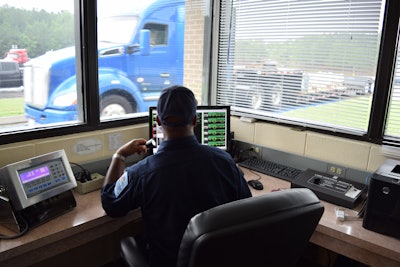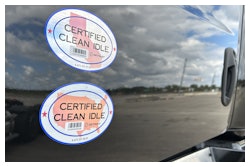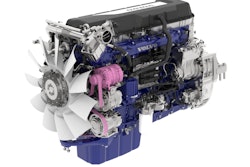
President Donald Trump on Monday signed an executive order giving the Federal Motor Carrier Safety Administration 60 days to return English language proficiency to its status as an out-of-service violation, and a recent analysis suggests that could have a big impact on the driver population.
According to the executive order, drivers should "be able to read and understand traffic signs, communicate with traffic safety, border patrol, agricultural checkpoints, and cargo weight-limit station officers." Trump and DOT Secretary Sean Duffy both referred to ELP as "common sense" in rolling out the order.
The Driver-Traffic Enforcement Committee of the Commercial Vehicle Safety Alliance, which sets the out-of-service criteria, immediately voted to go along with Trump's order, but that organization, for decades, has found the regulations around ELP "vague" and "open to interpretation."
Nonetheless, with clear direction from the president, as reported previously, CVSA says to prepare for enforcement of the regulation as it's written. It "requires drivers operating in the U.S. to be proficient in the English language, per the standard," said Adrienne Gildea, deputy executive director of CVSA. "All drivers operating in the U.S. should be prepared to meet that standard."

In 2014, CVSA's membership -- comprised of 70 federal, state, provincial, territorial and local commercial motor vehicle safety officials and industry representatives from the U.S., Mexico and Canada -- voted to remove English language proficiency from its North American Standard Out-of-Service Criteria precisely because of uncertainties around enforcing the rule.
"The primary reason" for removing the ELP violation from the OOS criteria "was because CVSA was unable to get enough or clear data to make a confident determination of its impact on highway safety and whether it was an imminent hazard," said Steve Keppler of Scopelitis Transportation Consulting, who helmed CVSA at the time.
CVSA found the proficiency regulation hard to enforce, too, Keppler added. The ELP reg is still enforced it today, just at a much lower rate than before when it was an out-of-service violation, and before FMCSA issued 2016 guidance further relaxing enforcement to allow for translation aides.
Analysis from FTR Transportation Intelligence's trucking VP, Avery Vise, found that in the last two years, authorities issued 15,200 ELP violations attributable to around 13,000 unique VINs.
Before ELP was taken out of the OOS criteria, violations happened at a much higher rate. "FTR identified nearly 100,700 ELP violations in 2014 – the final year before CVSA dropped ELP as an OOS violation."
Of those 2014 violations, Vise noted, more than 3,900 were out-of-service violations.
If enforcement practice around ELP violations returns to the way it was 10 years ago, it could significantly impact a large number of operators on the road today.
The specific language regulation, 49 CFR 391.11(b)2, requires a driver to "read and speak the English language sufficiently to converse with the general public, to understand highway traffic signs and signals in the English language, to respond to official inquiries, and to make entries on reports and records."
Keppler told Overdrive "the way the rule is currently written, it is too subjective." A big part of CVSA's mission is to ensure consistent enforcement action across three countries with three national languages. With all the variation in how people talk, regional accents, and other real-world factors that impact how well two people can converse in a given situation, CVSA has long sought clearer guidelines.
"While FMCSA previously published some guidance on this there needs to be more clear and definitive guidance developed to help ensure consistency in enforcement," Keppler continued.
Trump's executive order asks FMCSA to issue new guidance around the regulation, and Keppler said at the CVSA Spring "Workshop" summit that's ongoing this week, "FMCSA mentioned they will be developing guidance for how to interpret the rule.
"This is good as it is something CVSA requested from them back in 2003 when I worked there. I suspect CVSA will develop guidance for enforcement once this happens, which should help in having more consistent enforcement. This will also help industry in complying with the rule as well," said Keppler.
[Related: Trump admin reviewing non-domiciled CDLs for foreign drivers: How many are there?]
In 2003, CVSA petitioned FMCSA to get more specific on the regulation, stating that both "highway and officer safety are at issue."
Owner-Operator Independent Drivers Association Executive Vice President Lewie Pugh told Overdrive at the Mid-America Trucking Show that often inspectors don't want to even inspect a truck if the driver doesn't speak English.
"We know what happens is, even if motor carrier enforcement writes them a ticket for the violation that they don’t speak English," Pugh said, "they don’t inspect the truck because they’re not getting under a truck with somebody that doesn’t speak English. I don’t blame them. I wouldn’t, either. Some guys who do speak English I’d be afraid to get under the truck."
That was also an issue 22 years ago, according to CVSA's petition to FMCSA: "There have been instances where the inability of commercial drivers to adequately communicate with and understand officer instructions has compromised the inspection process, and in some cases has resulted in injuries to inspectors. Additionally, there have been instances where this has compromised highway safety."
CVSA also in 2003 found it "important" to note that "this issue is not necessarily specific to operators from Canada or Mexico." Rather, the petition went on, "it is with new residents to the United States" as there are "many immigrants from all parts of the globe who come to the United States and seek employment in the truck and bus industry.
"These are the predominant commercial drivers that are seen as having difficulty speaking the English language," the petition said.
That petition presented FMCSA with five options, one of which was to simply do nothing. The other four offered paths to improvement:
- Remove the reg entirely.
- Work with CVSA to develop a standard test procedure and education materials.
- Adopt a resolution putting the onus on motor carriers to communicate effectively.
- Address the issue by making it part of Commercial Drivers Licensing requirements.
Keppler doesn't know of a standardized test for English language proficiency, he said, but the CVSA's vote on Tuesday called for making language in commercial driver's licensing consistent with 49 CFR 391.11(b)2.
For answers on how law enforcement might handle roadside language checks, Overdrive contacted the Arkansas Highway Police, part of the state's DOT. Arkansas recently passed a bill requiring CMV drivers to speak English or face $500 fines. Where CVSA found room for interpretation, Arkansas didn't quibble over the language too much.
Asked how Arkansas Highway Police will test ELP, a spokesperson said "there is no roadside test given, but the regulation is specific on what a CMV driver must be able to do."










